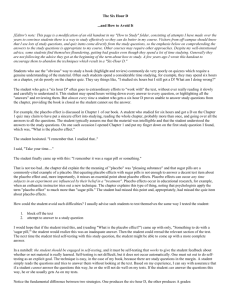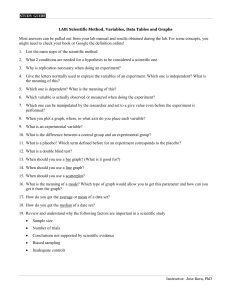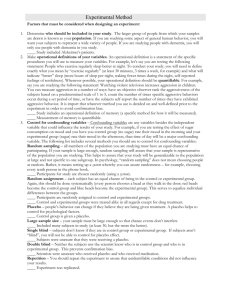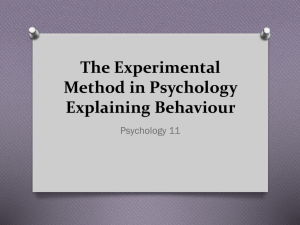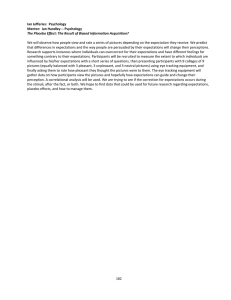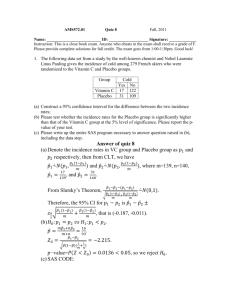The Six Hour D ...and How to Avoid It
advertisement
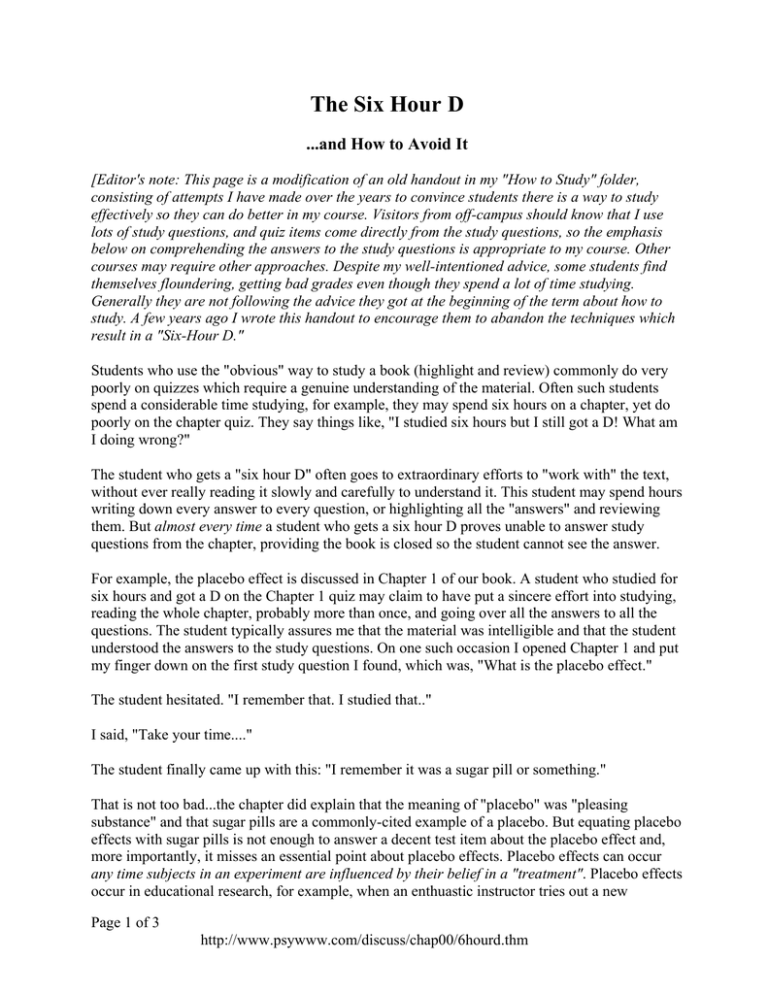
The Six Hour D ...and How to Avoid It [Editor's note: This page is a modification of an old handout in my "How to Study" folder, consisting of attempts I have made over the years to convince students there is a way to study effectively so they can do better in my course. Visitors from off-campus should know that I use lots of study questions, and quiz items come directly from the study questions, so the emphasis below on comprehending the answers to the study questions is appropriate to my course. Other courses may require other approaches. Despite my well-intentioned advice, some students find themselves floundering, getting bad grades even though they spend a lot of time studying. Generally they are not following the advice they got at the beginning of the term about how to study. A few years ago I wrote this handout to encourage them to abandon the techniques which result in a "Six-Hour D." Students who use the "obvious" way to study a book (highlight and review) commonly do very poorly on quizzes which require a genuine understanding of the material. Often such students spend a considerable time studying, for example, they may spend six hours on a chapter, yet do poorly on the chapter quiz. They say things like, "I studied six hours but I still got a D! What am I doing wrong?" The student who gets a "six hour D" often goes to extraordinary efforts to "work with" the text, without ever really reading it slowly and carefully to understand it. This student may spend hours writing down every answer to every question, or highlighting all the "answers" and reviewing them. But almost every time a student who gets a six hour D proves unable to answer study questions from the chapter, providing the book is closed so the student cannot see the answer. For example, the placebo effect is discussed in Chapter 1 of our book. A student who studied for six hours and got a D on the Chapter 1 quiz may claim to have put a sincere effort into studying, reading the whole chapter, probably more than once, and going over all the answers to all the questions. The student typically assures me that the material was intelligible and that the student understood the answers to the study questions. On one such occasion I opened Chapter 1 and put my finger down on the first study question I found, which was, "What is the placebo effect." The student hesitated. "I remember that. I studied that.." I said, "Take your time...." The student finally came up with this: "I remember it was a sugar pill or something." That is not too bad...the chapter did explain that the meaning of "placebo" was "pleasing substance" and that sugar pills are a commonly-cited example of a placebo. But equating placebo effects with sugar pills is not enough to answer a decent test item about the placebo effect and, more importantly, it misses an essential point about placebo effects. Placebo effects can occur any time subjects in an experiment are influenced by their belief in a "treatment". Placebo effects occur in educational research, for example, when an enthuastic instructor tries out a new Page 1 of 3 http://www.psywww.com/discuss/chap00/6hourd.thm technique. The chapter explains this type of thing, noting that psychologists apply the term "placebo effect" to much more than "sugar pills." The student had missed this point and, appropriately, had missed the quiz item about placebo effects. How could the student avoid such difficulties? I usually advise such students to test themselves the same way I tested the student: 1. block off the text 2. attempt to answer to a study question I would hope that if the student tried this, and (reading "What is the placebo effect?") came up with only, "Something to do with a 'sugar pill,'" the student would realize this was an inadequate answer. Then the student could reread the relevant section of the text. The next time the student tried self-testing with this study question, the student might be able to come up with a more complete answer. In a nutshell: the student should be engaged in self-testing, and it must be self-testing that works to give the student feedback about whether or not material is really learned. Self-testing is not difficult, but it does not occur automatically. One must set out to do self-testing as an explicit goal. The technique is easy, in the case of my book, because there are study questions in the margin. A student simply reads the questions and tries to answer them without looking at the text. Based on my experience, I can say with assurance that if a student cannot answer the questions this way, he or she will not do well on my tests. If the student can answer the questions this way, he or she usually gets As on my tests. Notice the fundamental difference between two strategies. One produces the six-hour D, the other produces A grades: • • Strategy 1: Match the question to an answer on the page. Perhaps highlight the answer. Look back and forth until the answer is understood. [This produces poor results because people usually feel like they understand something while they are reading it.] Strategy 2: Read the material, trying to understand the underlying ideas. A few minutes later, go back to the page, block off the text, read the question, and see if the answer can be retrieved from memory. [This reveals whether a person has truly understood the ideas and retains them in retrievable form.] Among my students, I see strategy #1 being used all too often, despite the fact that I warn strongly against it. My chapters are full of study questions, so "looking back and forth between the question and answer" seems like an obvious study strategy. Students who claim to be putting in the necessary time, reading the whole chapter and studying it hard, yet getting poor results (such as Ds and Fs) usually assure me that they do "understand" or "know the answers to" the study questions. Yet, practically 100% of the time, they cannot answer a question drawn at random from the chapter, if the book is closed. Clearly these students are deceiving themselves about whether they really understand they material, and it is not hard to see why. They probably feel that they understand the material while Page 2 of 3 http://www.psywww.com/discuss/chap00/6hourd.thm they are looking at it. But they cannot recall it independently, given only the study question as a cue, and (most importantly) they are not testing themselves to find this out. Self-testing is an example of what psychologists call metacognition, or "thinking about thinking." The self-testing procedure I recommend--Procedure #2 above--is a simple metacognitive procedure which allows students to determine whether or not they truly understand the material. I maintain that "memorization" is irrelevant to this process. Good memory comes from comprehension, not the activities most students called "memorization." No student should be forced to "memorize" over 100 answers to study questions anyway; that is torture. But students can and should be asked to comprehend new ideas. If they comprehend ideas, memory comes naturally. In general, memorization is a poor approach to college-level studying. Memorization of superficial details will not work in any but the most pathetically superficial college courses. Instead, you have to understand ideas. This means building something new in your brain. The way to find out if you can "construct" an idea is to require yourself to produce it, given a modest cue such as a study question. That is why the How to Study this Book sheet which I give to my students recommends that they practice speaking aloud the answers to the study questions without looking at the page. Even if you are not using my book, and your book does not have study questions, you can (and should) adopt some form of self-testing strategy resembling this. Here is an e-mail message I received from a student which relates directly to this. Your study questions are making it easier for me to score a decent grade on your tests, but they are providing me with much more than easier ways to find answers. They are helping me to learn to spot more important points in other texts that I read, by imagining study questions next to the text. Up to this point, I would read an assignment that I knew I would be tested on and find myself not absorbing what was being said because I was worrying too much about picking out the important information. I am now learning to read--- just read--then go back to each paragraph and make a study question for it in the margins. Then I go back again and answer the questions. To sum this up, I am getting more than knowledge of Introductory Psychology from your class, you are helping with my study skills. Please continue to offer this to your future students because I am sure there are a lot of others out here in Studentland that need just this type of help. [--Fall, '95 student] I was delighted to read this. All instructors hope that their students will receive benefits from their courses which carry over to other courses. I hope lots of other students get similar benefits. APA-style reference for this page: Dewey, R. (1997, February 12) The "6 hour D" and how to avoid it. [Online]. Available: http://www.gasou.edu/psychweb/discuss/ch00/6hourd.htm. Page 3 of 3 http://www.psywww.com/discuss/chap00/6hourd.thm
